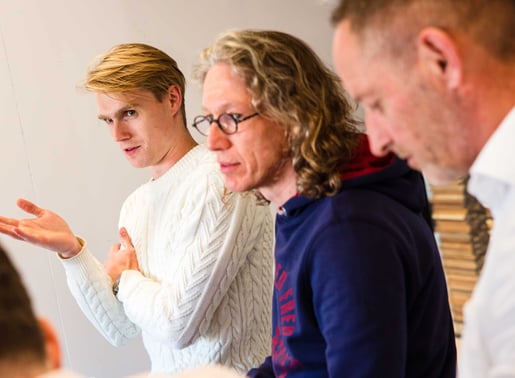Buckle up! Let's explore the realm of platform engineering further and discover how to build the platform engineering team of your dreams. Just in case it slipped your mind, we previously uncovered the incredible benefits of platform engineering and navigated you towards kickstarting your internal platform service. If you've already followed the steps outlined in the second article and have established a sharp vision, value proposition, and scope, then it's time to transform from dreamer to doer – by building a platform engineering team capable of delivering the envisaged value.
Why do you need a platform engineering team?
A high-performance platform engineering team provides a stable foundation for application development, ensuring the underlying infrastructure and services are available, stable, and secure. Typically, a platform engineering team can achieve the following goals:
- Put your developers into the F1 driver’s seat to deliver features faster
Platform engineering teams provide developers with reusable building blocks and easy-to-use capabilities, enabling them to take control of everything it takes to deliver and operate a high-quality product. By benefiting from a set of internal self-service tools, developers can thus deliver features faster.
- Ensure software reliability, security, and compliance across the engineering team
The platform engineering team provides observability tools and operational insights to boost visibility so teams can react quickly to any incidents. In addition, they would also codify the essential security and compliance policies for cloud resources, ensuring software security and compliance for all platform users and are able to scale from one team to an entire enterprise.
Keep scrolling to discover the key ingredients for a winning team.

The main “superheroes” for any platform engineering team
The platform engineering team is the backbone of success. They have an extensive impact across the platform users, and their skills and approach are paramount to gaining user trust. Let's explore the key role archetypes that form the foundation of any Product team: the Product Owner/Manager, the Architect, the Tech Lead, Platform Engineers, and potentially, a Scrum Master or Facilitator as the team expands.
- Product Owner: The catalyst that propels the platform forward and ensures continuous delivery of value. This role involves "doing the right thing" – managing stakeholders and evangelizing the platform to potential and existing users.
- Architect: This could be an individual or a shared team responsibility. The architect helms the platform's design and architecture. In an enterprise setting, they also assist the Product Owner in managing architectural stakeholders.
- Tech Lead: An experienced engineer who coaches the team to continually hone their skills. The Tech Lead is a mentor for junior engineers and the go-to for technological improvements. While the Scrum Master facilitates continuous improvement, the Tech Lead leads by example with their substantial contributions.
- Platform Engineers: These are the main contributors to delivering and maintaining the platform. They should also possess communication skills to work with users, onboard them, and potentially even train them in adopting best practices. This role aligns closely with a DevOps engineer role and carries a user-centric mindset. Platform Engineers are driven by crafting an exceptional platform and delivering value to its users. Their specialisms can vary from Security and Software Quality to Site Reliability Engineering, Data Engineering, or Software Development. Platform Engineers are also typically responsible for on-call rotations, so ensure you have a sufficient, willing team.
Building a successful platform engineering team involves a myriad of factors. The context of your organization—its size, current technological maturity, industry, and specific needs—should inform your staffing decisions. For a small business, a lean team of dedicated engineers with overlapping competencies might suffice. In contrast, a large corporation may necessitate an expansive team with members specializing in distinct areas. The key is to strike a balance: an optimally sized team with a well-rounded skillset that aligns with your organization's specific needs.
Typical “superpowers” needed for a winning team
To take full advantage of Platform Engineering, it is crucial to combine various engineering practices under its umbrella. This means that your platform team needs to have expertise in multiple areas.
Hard skills
- Cloud Platforms and cloud adoption frameworks
- Software Development to understand the users
- Platform Engineering to build a modern platform
- CI/CD and Infrastructure-as-Code
- Observability to monitor system state
- Security
- Platform Architecture to build a scalable and maintainable platform
- Automation to enhance efficiency and reduce human error
- End-to-end responsibility for both developing and deploying the platform
Soft skills
The platform team needs to embrace the positive aspects of Agile/DevOps culture: knowledge-sharing and a collaborative mindset. Additionally, to keep up with technological development, the team should be committed to continuous learning, and embrace emerging technologies and industry best practices.
Foster a robust engineering culture
A robust engineering culture unites your platform engineering team as a collective force while empowering each member to unlock their full potential.
- Clear vision as the northern star
If everyone is pulling in different directions, we are not going anywhere. It’s essential to have a sharp vision and roadmap that align and guide the platform team’s work. The platform engineering team needs to find what is most valuable for both platform users and the organization. Having a sharp vision in mind enables them to deliver platform capabilities in need. A roadmap serves as a communication tool that clarifies goals, timelines, milestones, and deliverables to ensure everything is on track.
A sharp vision is a compass that aligns your team’s work, boosts motivation, and nurtures a sense of purpose.
- Build and empower your diversified team
Diversity in a platform engineering team goes beyond the standard definitions. It encapsulates diversity in experience, skills, perspectives, and cognitive approaches. The multi-disciplinary teams foster creativity and innovation, helping in more comprehensive problem-solving. Considering the variations in skillsets and capabilities, creating a psychologically safe work environment is crucial for team leaders to unleash the full potential of each team member. At Xebia, the motto “Act First, Apologize Later” is prevalent, as we passionately believe that the trust in our Xebian family is the one of key ingredients for us to thrive. Trust teams of diversified professionals to make their own decisions. They are the captains of their jobs. Even if they make mistakes and are off-the-course temporarily, they will learn from failures and become a better version of themselves.
- Reinforce each other through knowledge-sharing
As previously stated, your platform engineering team needs to grasp a broad range of skill sets to unlock the full potential of platform engineering initiatives. To upskill your platform engineering team, knowledge-sharing within the organization is a fascinating avenue.
Encourage a culture of learning by hosting regular knowledge exchange sessions, where your team can share ideas and insights in a supportive environment. At Xebia, we make knowledge-sharing as normal as breathing with our “Innovation Days” and “Xebia Knowledge Exchange Session”, leaving our team with loads of insights and fun. Don’t take our word for it. Try it yourself and get your team to grow!

In conclusion, building a high-performing platform engineering team is key to succeeding in your platform engineering efforts. It requires the right roles and team composition, the right skills and a team that embodies an innovative and learning culture. However, the investment pays off significantly, resulting in a team capable of building and maintaining an effective platform service that delivers immense value to the organization and its users.
We love knowledge-sharing, both within and outside the organization. Find more insightful thoughts about Platform Engineering!





